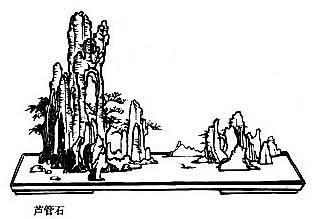易
經
Yi Jing 
 – I Ching, the Book of Changes
– I Ching, the Book of Changes
This famous system of 64 hexagrams plus their commentaries and transformations is at the root of Chinese thought. Tr. Wilhelm (en, fr).
| 55. 豐 Fêng / Abundance [Fullness] | ||||||||||||||||||||||||||||||||||||||||||||||||||||||||||||||||
| |||||||||||||||||||||||||||||||||||||||||||||||||||||||||||||||||
|
current binomial swap trig. opposite flip X leading master X constituent master
The Hexagram


Above CHÊN THE AROUSING, THUNDER
Below LI THE CLINGING, FIRE
Chên is movement; Li is flame, whose attribute is clarity. Clarity within, movement without–this produces greatness and abundance. The hexagram pictures a period of advanced civilization. However, the fact that development has reached a peak suggests that this extraordinary condition of abundance cannot be maintained permanently.
The Judgment


The king attains abundance.
Be not sad.
Be like the sun at midday.
It is not given to every mortal to bring about a time of outstanding greatness and abundance. Only a born ruler of men is able to do it, because his will is directed to what is great. Such a time of abundance is usually brief. Therefore a sage might well feel sad in view of the decline that must follow. But such sadness does not befit him. Only a man who is inwardly free of sorrow and care can lead in a time of abundance. He must be like the sun at midday, illuminating and gladdening everything under heaven.
The Image


The image of ABUNDANCE.
Thus the superior man decides lawsuits
And carries out punishments.
This hexagram has a certain connection with Shih Ho, BITING THROUGH (21), in which thunder and lightning similarly appear together, but in the reverse order. In BITING THROUGH, laws are laid down; here they are applied and enforced. Clarity [Li] within makes it possible to investigate the facts exactly, and shock [Chên] without ensures a strict and precise carrying out of punishments.
Lower line


When a man meets his destined ruler,
They can be together ten days,
And it is not a mistake.
Going meets with recognition.
To bring about a time of abundance, a union of clarity with energetic movement is needed. Two individuals possessed of these two attributes are suited to each other, and even if they spend an entire cycle of time together during the period of abundance, it will not be too long, nor is it a mistake. Therefore one may go forth, in order to make one's influence felt; it will meet with recognition.
Second line


The curtain is of such fullness
That the polestars can be seen at noon.
Through going one meets with mistrust and hate.
If one rouses him through truth,
Good fortune comes.
It often happens that plots and party intrigues, which have the darkening effect of an eclipse of the sun, come between a ruler intent on great achievement and the man who could effect great undertakings. Then, instead of the sun, we see the northern stars in the sky. The ruler is overshadowed by a party that has usurped power. If a man at such a time were to try to take energetic measures, he would encounter only mistrust and envy, which would prohibit all movement. The essential thing then is to hold inwardly to the power of truth, which in the end is so strong that it exerts an invisible influence on the ruler, so that all goes well.
Third line


The underbrush is of such abundance
That the small stars can be seen at noon.
He breaks his right arm. No blame.
The image is that of a progressive covering over of the sun. Here the eclipse reaches totality, therefore even the small stars can be seen at noon.
In the sphere of social relationships, this means that the prince is now so eclipsed that even the most insignificant persons can push themselves into the foreground. This makes it impossible for an able man, though he might be the right hand of the ruler, to undertake anything. It is as though his arm were broken, but he is not to blame for being thus hindered in action.
Fourth line


The curtain is of such fullness
That the polestars can be seen at noon.
He meets his ruler, who is of like kind.
Good fortune.
Here the darkness is already decreasing, therefore interrelated elements come together. Here too the complement must be found–the necessary wisdom to complement joy of action. Then everything will go well. The complementary factor postulated here is the reverse of the one in the first line. In the latter, wisdom is to be complemented by energy, while here energy is complemented by wisdom.
Fifth line


Lines are coming,
Blessing and fame draw near.
Good fortune.
The ruler is modest and therefore open to the counsel of able men. Thus he is surrounded by men who suggest to him the lines of action. This brings blessing, fame, and good fortune to him and all the people.
Upper line


His house is in a state of abundance.
He screens off his family.
He peers through the gate
And no longer perceives anyone.
For three years he sees nothing.
Misfortune.
This describes a man who because of his arrogance and obstinacy attains the opposite of what he strives for. He seeks abundance and splendor for his dwelling. He wishes at all odds to be master in his house, which so alienates his family that in the end he finds himself completely isolated.
"The Book of Conciousness and Life."

I Ching, the Book of Changes – Yi Jing I. 55. – Chinese on/off – Français/English
Alias Yijing, I Ching, Yi King, I Ging, Zhou yi, The Classic of Changes (Lynn), The Elemental Changes (Nylan), Le Livre des Changements (Javary), Das Buch der Wandlung.
The Book of Odes, The Analects, Great Learning, Doctrine of the Mean, Three-characters book, The Book of Changes, The Way and its Power, 300 Tang Poems, The Art of War, Thirty-Six Strategies
Welcome, help, notes, introduction, table.
Index – Contact – Top









